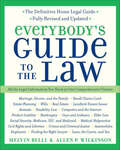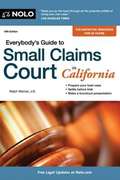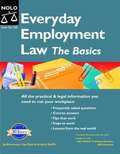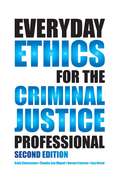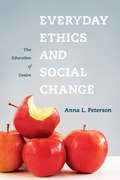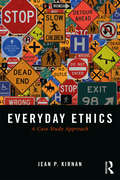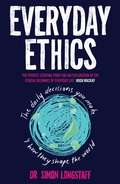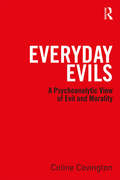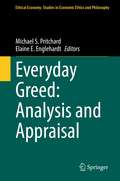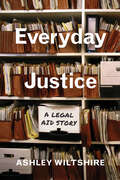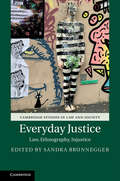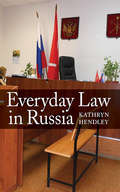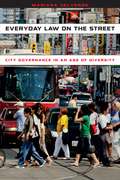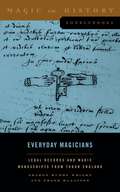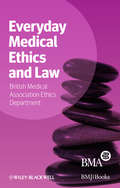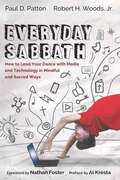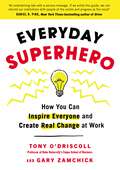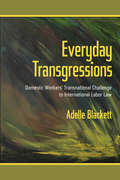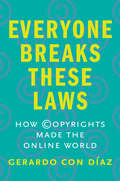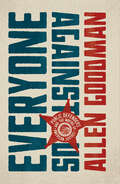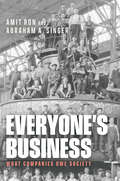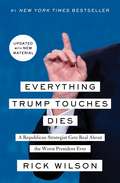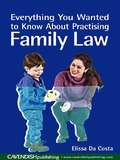- Table View
- List View
Everybody's Guide to the Law: All The Legal Information You Need in One Comprehensive Volume
by Melvin M. Belli Allen Wilkinson“[A] comprehensive and well-organized directory to areas of law that affect the average person’s everyday life.”—BooklistWhat are your rights if the car you bought is useless? If your ex-boss refuses to let you take along your Rolodex? Who gets custody of the children after a divorce? Do you worry about laws governing your use of the Internet? What rights are accorded to the elderly, disabled, and other social minorities? How can you successfully sue in small claims court? Or write your own will?The law pervades every individual's life, yet few know just what their rights are, how to use them, and what to do when they're violated. With expert assistance from Everybody's Guide to the Law, all your legal questions and concerns will be answered in simple everyday language that demystifies the law and arms you with the right information to make the best decisions.While a host of Web sites and books claim to help you understand the law, this fully revised and updated edition of the essential home legal reference is your one-stop guide. Comprehensive, accurate, and with no hidden gimmicks or programs to sell you (unlike most online "resources"), this superbly readable, indispensable addition to any home library provides up-to-date and easy-to-understand practical legal information most people need to know.Praised by critics and embraced by the public, Everybody's Guide to the Law remains the standard by which all other home legal guides aspire to, but have never managed to meet.
Everybody’s Guide to Small Claims Court in California
by Ralph Warner AttorneyEvaluate your claim, figure out your best course of action and represent yourself in small claims court with this definitive guide Everybody's Guide to Small Claims Court in California gives you step-by-step instructions to bring or defend your case. From preparing evidence and lining up persuasive witnesses, to making a presentation in court and collecting the money you're awarded, this plain English book leads you through the entire process of going to court without a lawyer. Plus, it's the only book around that helps you factor in out-of-court issues, such as personal relationships, to help you determine whether going to court is worth the potential for recovery. Everybody's Guide to Small Claims Court in California shows you how to: . evaluate whether you have a winning case . mediate a settlement . determine how much to sue for . write your demand letter . file and serve papers . prepare evidence and witnesses for court . plan a winning courtroom strategy . convince the judge that you are right . collect your money when you win This edition is updated with the latest rules and statutes for California's small claims courts, including instructions for accessing local courts and finding out their procedures.
Everyday Employment Law: The Basics (2nd edition)
by Lisa Guerin Amy DelpoFor business owners, managers and supervisors who need answers NOW. A user-friendly and handy reference tool that's written in Nolo's non-jargon style, Everyday Employment Law will be the book that owners and managers reach for when they need answers to their questions about hiring, firing and everything in between. Filled with dozens of resources, online and off, it provides answers to FAQs, concise answers, tips that work, traps to avoid, real-world interviews and information, plus 50-state legal charts, so readers can find the answers they need quickly and easily.
Everyday Ethics For The Criminal Justice Professional
by Durant Frantzen Kelly Cheeseman Lisa Nored Claudia MiguelEveryday Ethics for the Criminal Justice Professional focuses on getting students to think about ethics in the day-to-day context. By placing an emphasis on practical applications as opposed to theoretical ideologies the book is more user friendly to the student of the 21st century. Unlike other texts, it includes forensics and private security in the list of criminal justice professions, their impact on the field and what it means to ''do business'' in criminal justice. The text also utilizes practical scenarios in in the career fields of policing, institutional corrections, community corrections, prosecutors and judges, private security, criminal justice supervision and forensics to allow for students to apply theoretical concepts to real life criminal justice situations. The text prepares students to think and process through ethics in both the concrete and abstract.
Everyday Ethics and Social Change: The Education of Desire
by Anna L. PetersonAmericans increasingly cite moral values as a factor in how they vote, but when we define morality simply in terms of a voter's position on gay marriage and abortion, we lose sight of the ethical decisions that guide our everyday lives. In our encounters with friends, family members, nature, and nonhuman creatures, we practice a nonutilitarian morality that makes sacrifice a rational and reasonable choice. Recognizing these everyday ethics, Anna L. Peterson argues, helps us move past the seemingly irreconcilable conflicts of culture and refocus on issues that affect real social change. Peterson begins by divining a "second language" for personal and political values, a vocabulary derived from the loving and mutually beneficial relationships of daily life. Even if our interactions with others are fleeting and fragmentary, they provide a viable alternative to the contractual and atomistic attitudes of mainstream culture. Everyday ethics point toward a more just, humane, and sustainable society, and to acknowledge moments of grace in our daily encounters is to realize a different way of relating to people and nonhuman nature - an alternative ethic to cynicism and rank consumerism. In redefining the parameters of morality, Peterson enables us to make fundamental problems such as the distribution of wealth, the use of public land and natural resources, labor and employment policy, and the character of political institutions the preferred focus of debate and action.
Everyday Ethics and Social Change: The Education of Desire
by Anna PetersonAmericans increasingly cite moral values as a factor in how they vote, but when we define morality simply in terms of a voter's position on gay marriage and abortion, we lose sight of the ethical decisions that guide our everyday lives. In our encounters with friends, family members, nature, and nonhuman creatures, we practice a nonutilitarian morality that makes sacrifice a rational and reasonable choice. Recognizing these everyday ethics, Anna L. Peterson argues, helps us move past the seemingly irreconcilable conflicts of culture and refocus on issues that affect real social change.Peterson begins by divining a "second language" for personal and political values, a vocabulary derived from the loving and mutually beneficial relationships of daily life. Even if our interactions with others are fleeting and fragmentary, they provide a viable alternative to the contractual and atomistic attitudes of mainstream culture. Everyday ethics point toward a more just, humane, and sustainable society, and to acknowledge moments of grace in our daily encounters is to realize a different way of relating to people and nonhuman nature-an alternative ethic to cynicism and rank consumerism. In redefining the parameters of morality, Peterson enables us to make fundamental problems such as the distribution of wealth, the use of public land and natural resources, labor and employment policy, and the character of political institutions the preferred focus of debate and action.
Everyday Ethics: A Case Study Analysis
by Jean P. KirnanThis book expands the current discussion on ethics, addressing the gap between "headline" ethics cases, which are often extreme and taken from a business context, and the everyday ethical challenges that we all face in school, work, relationships, and communities. Case studies throughout demonstrate concepts and provide opportunities for readers to apply theory as they consider everyday issues such as the temptation to lie about an arrest on a job application, peer pressure to steal or drink, and the implications of "ratting out" a classmate who is cheating or a co-worker who is stealing. By including a broad array of ethical challenges, this book makes ethics more accessible to the reader. Drawing from several academic disciplines, including social psychology and organizational behavior, this book explores the personal and environmental factors that influence our ethical decision-making. The book is appropriate for ethics courses in an array of disciplines as well as anyone interested in ethical challenges.
Everyday Ethics: A Guide For The Ethical Professional
by Dr Simon LongstaffDo I buy eggs laid by free-range chooks or the cheaper ones from caged birds? Do I tell my best friend I saw her boyfriend kissing another girl? Do I lie to my mum by telling her I will wear the jumper she bought me, even though it’s the ugliest jumper in the world? Every day our lives are punctuated by points of decision. Some of these decisions will be momentous, remembered for decades: most will go unnoticed, by us and by others. Yet all our choices matter: taken as a whole, they shape our lives and contribute to the rhythms of the world. In Everyday Ethics, Australia’s leading authority on ethics, Simon Longstaff, provides a map to help you better navigate the landscape of daily decisions more ethically. Using a broad range of topics and examples to provoke eye-opening reflection and discussion, Everyday Ethics is a lesson in how even our smallest choices can matter, and an empowering guide that will help us discover what is ‘good’ and what is ‘right’.
Everyday Evils: A psychoanalytic view of evil and morality
by Coline CovingtonEveryday Evils takes a psychoanalytic look at the evils committed by "ordinary" people in different contexts – from the Nazi concentration camps to Stockholm Syndrome to the atrocities publicized by Islamic State – and presents new perspectives on how such evil deeds come about as well as the extreme ways in which we deny the existence of evil. Concepts of group behaviour, morality, trauma and forgiveness are reconsidered within a multi-disciplinary framework. The psychodynamics of dissociation, and the capacity to witness evil acts while participating in them, raise questions about the origin of morality, and about the role of the observing ego in maintaining psychic equilibrium. Coline Covington examines how we demonize the "other" and how violent actions become normalized within communities, such as during the Rwandan genocide and Polish pogroms. The recent attraction of the millenarian theocracy of the Islamic State also highlights our fascination with violence and death. Covington emphasizes that evil comes about through a variety of causes and is highly contextual. It is our capacity to acknowledge the evils we live with, witness and commit that is vital to how we manage and respond to violence within ourselves and others and in mitigating our innate destructiveness. In conclusion, the book addresses how individuals and societies come to terms with evil, along with the problematic concept of forgiveness and the restoration of good. Everyday Evils blends psychoanalytic concepts together with the disciplines of sociology, history, anthropology, philosophy, theology and studies of violence in order to develop a richer, deeper and more comprehensive understanding of evil. Intending to make the unthinkable thinkable, this book will appeal to scholars from across those disciplines, as well as psychoanalysts, psychotherapists and anyone who has ever asked the question: "How could anyone do something like that?"
Everyday Greed: Analysis and Appraisal (Ethical Economy #58)
by Michael S. Pritchard Elaine E. EnglehardtThis collection examines how greed should be understood and appraised. Roundly condemned by virtually all religions, greed receives mixed appraisals in the domains of business and economics. The volume examines these mixed appraisals and how they fare in light of their implications for greed in our everyday world. Greed in children is uniformly criticized by parents, other adults, and even children’s peers. However, in adulthood, greed is commended by some as essential to profit-seeking in business and for offering the greatest promise in promoting economic prosperity for everyone.Those who advocate a more permissive position on greed in the adult world typically concede that some constraints on greed are needed. However, the supporting literature offers little analysis of what greed is (as distinct from, for example, the effort to meet modest needs, or the pursuit of ordinary self-interested ends). It offers little clarification of what sorts of constraints on greed are needed. Nor is careful attention given to difficulties children might have in making a transition without moral loss from regarding greed as inappropriate to its later qualified acceptance. Through a secular approach, this book attempts to make significant inroads in remedying these shortcomings.
Everyday Justice: A Legal Aid Story
by Ashley WiltshireThe Legal Aid Society&’s mission is to advance, defend, and enforce the legal rights of low-income and otherwise vulnerable people in order to secure for them the basic necessities of life. Everyday Justice is an on-the-ground history of the Legal Aid Society of Middle Tennessee and the Cumberlands, the story of how national debates about access to justice have impacted the work of its lawyers, and a warning about why the federally imposed limits on that work must be lifted in order to fulfill the pledge of justice for all. Those surviving on low incomes often see the legal system as an oppressive force stacked against them. Everyday Justice is about lawyers trying to make the law work for these people. This book traces the development and evolution of legal aid in Middle Tennessee from the late 1960s to the turn of the millennium, as told by Ashley Wiltshire, who worked for the Legal Aid Society of Middle Tennessee and the Cumberlands in all its incarnations for four decades, beginning a year after its inception. Set in the context of the legal aid movement in the United States—beginning as a part of the social awakening in the post–Civil War era, continuing with volunteer efforts in the first part of the twentieth century, and coming to fruition beginning with the OEO Office of Legal Services grants of the 1960s as part of the War on Poverty—Everyday Justice is a story of Nashville, which levied an extended period of opposition because of prevailing cultural and religious views on race and poverty.
Everyday Justice: Law, Ethnography, Injustice (Cambridge Studies in Law and Society)
by Sandra BrunneggerEveryday Justice clearly demonstrates the value of revitalizing the category of justice in ethnographic work by revealing how both justice and injustice are woven into everyday life in manifold and widely differing ways. The contributors account for this complexity across multiple particular social relations, places, and times, such that concepts and experiences of justice are made analytically visible yet without essentializing the construal of justice both as an idea and in practice. In the best scholarly tradition, Everyday Justice provides theoretical readings of justice and injustice, justice and law, and relational justice, each designed to cut through the specificity of myriad social, political, and legal conjunctures in a clarifying way. One outcome is to suggest future research possibilities to readers by highlighting theoretically distinctive yet ethnographically specific questions about justice. Everyday Justice will be essential reading for anyone interested in justice in theory and practice.
Everyday Law in Russia
by Kathryn HendleyEveryday Law in Russia challenges the prevailing common wisdom that Russians cannot rely on their law and that Russian courts are hopelessly politicized and corrupt. While acknowledging the persistence of verdicts dictated by the Kremlin in politically charged cases, Kathryn Hendley explores how ordinary Russian citizens experience law. Relying on her own extensive observational research in Russia's new justice-of-the-peace courts as well as her analysis of a series of focus groups, she documents Russians’ complicated attitudes regarding law. The same Russian citizen who might shy away from taking a dispute with a state agency or powerful individual to court might be willing to sue her insurance company if it refuses to compensate her for damages following an auto accident. Hendley finds that Russian judges pay close attention to the law in mundane disputes, which account for the vast majority of the cases brought to the Russian courts. Any reluctance on the part of ordinary Russian citizens to use the courts is driven primarily by their fear of the time and cost—measured in both financial and emotional terms—of the judicial process. Like their American counterparts, Russians grow more willing to pursue disputes as the social distance between them and their opponents increases; Russians are loath to sue friends and neighbors, but are less reluctant when it comes to strangers or acquaintances. Hendley concludes that the "rule of law" rubric is ill suited to Russia and other authoritarian polities where law matters most—but not all—of the time.
Everyday Law on the Street: City Governance in an Age of Diversity
by Mariana ValverdeToronto prides itself on being "the world's most diverse city," and its officials seek to support this diversity through programs and policies designed to promote social inclusion. Yet this progressive vision of law often falls short in practice, limited by problems inherent in the political culture itself. In Everyday Law on the Street, Mariana Valverde brings to light the often unexpected ways that the development and implementation of policies shape everyday urban life. Drawing on four years spent participating in council hearings and civic association meetings and shadowing housing inspectors and law enforcement officials as they went about their day-to-day work, Valverde reveals a telling transformation between law on the books and law on the streets. She finds, for example, that some of the democratic governing mechanisms generally applauded-public meetings, for instance-actually create disadvantages for marginalized groups, whose members are less likely to attend or articulate their concerns. As a result, both officials and citizens fail to see problems outside the point of view of their own needs and neighborhood. Taking issue with Jane Jacobs and many others, Valverde ultimately argues that Toronto and other diverse cities must reevaluate their allegiance to strictly local solutions. If urban diversity is to be truly inclusive-of tenants as well as homeowners, and recent immigrants as well as longtime residents-cities must move beyond micro-local planning and embrace a more expansive, citywide approach to planning and regulation.
Everyday Magicians: Legal Records and Magic Manuscripts from Tudor England (Magic in History Sourcebooks)
by Frank Klaassen Sharon Hubbs WrightMost of the women and men who practiced magic in Tudor England were not hanged or burned as witches, despite being active members of their communities. These everyday magicians responded to common human problems such as the vagaries of money, love, property, and influence, and they were essential to the smooth functioning of English society. This illuminating book tells their stories through the legal texts in which they are named and the magic books that record their practices.In legal terms, their magic fell into the category of sin or petty crime, the sort that appeared in the lower courts and most often in church courts. Despite their relatively lowly status, scripts for the sorts of magic they practiced were recorded in contemporary manuscripts. Juxtaposing and contextualizing the legal and magic manuscript records creates an unusually rich field to explore the social aspects of magic practice. Expertly constructed for both classroom use and independent study, this book presents in modern English the legal documents and magic texts relevant to ordinary forms of magic practiced in Tudor England. These are accompanied by scholarly introductions with original perspectives on the subjects. Topics covered include: the London cunning man Robert Allen; magic to identify thieves; love magic; magic for hunting, fishing and gambling, and magic for healing and protection.
Everyday Medical Ethics and Law
by BMA Medical Ethics DepartmentEveryday Medical Ethics and Law is based on the core chapters of Medical Ethics Today, focussing on the practical issues and dilemmas common to all doctors. It includes chapters on the law and professional guidance relating to consent, treating people who lack capacity, treating children and young people, confidentiality and health records. The title is UK-wide, covering the law and guidance in each of the four nations. Each chapter has a uniform structure which makes it ideal for use in learning and teaching. "10 Things You Need to Know About..." introduces the key points of the topic, Setting the Scene explains where the issues occur in real life and why doctors need to understand them, and then key definitions are followed by explanations of different scenarios. The book uses real cases to illustrate points and summary boxes to highlight key issues throughout. Whilst maintaining its rigorous attention to detail, Everyday Medical Ethics and Law is an easy read reference book for busy, practising doctors.
Everyday Sabbath: How to Lead Your Dance With Media and Technology in Mindful and Sacred Ways
by Robert H. Woods Nathan Foster Paul D. Patton Al KrestaThe authors, writing as scholars of communication and media, demonstrate how God’s great gifts of media and technology can rob us of everyday Sabbath and impede spiritual growth if not faithfully stewarded through a process described as mindful media attachment. Mindful media attachment helps to promote the “holy habits” of sacred intentionality, sacred interiority, and sacred identity. These “three sacreds,” which arise from a proper understanding of the “grammar and language” of media and technology, ultimately allow us to avoid treating media and technology as ends in and of themselves and to avoid divided affections that drain energy, purpose, and kingdom service.
Everyday Superhero: How You Can Inspire Everyone And Create Real Change At Work
by Tony O'Driscoll Gary Zamchick'An entertaining tale with a serious message . . . we can rebuild our institutions with people at the centre and progress as the result!' Daniel H. Pink, bestselling author of DriveAre you struggling to create profound, lasting change in your organisation? Everyday Superhero is a simple story with a powerful solution. Meet a stressed young manager, Mae B, whose teams are being led by an authoritarian CEO. We join her on her mission to overhaul the outdated leadership systems obsessed by power, profit and process and fight for central leadership that prioritises people, purpose and principles. It's the start of a journey into a new vision of leadership, one that has been designed to take on the challenges that organisations face today. And if we follow Mae B's lead, we can all create change, when we need it most. Developed from the author's academic research at Duke University, this memorable adventure will help you create lasting change in complex and chaotic times.'This powerful book tells the story of how leaders can unlock every employee's superpower to create lasting change' Dorie Clark, bestselling author of The Long Game
Everyday Transgressions: Domestic Workers' Transnational Challenge to International Labor Law
by Adelle BlackettAdelle Blackett tells the story behind the International Labour Organization's (ILO) Decent Work for Domestic Workers Convention No. 189, and its accompanying Recommendation No. 201 which in 2011 created the first comprehensive international standards to extend fundamental protections and rights to the millions of domestic workers laboring in other peoples' homes throughout the world. As the principal legal architect, Blackett is able to take us behind the scenes to show us how Convention No. 189 transgresses the everyday law of the household workplace to embrace domestic workers' human rights claim to be both workers like any other, and workers like no other. In doing so, she discusses the importance of understanding historical forms of invisibility, recognizes the influence of the domestic workers themselves, and weaves in poignant experiences, infusing the discussion of laws and standards with intimate examples and sophisticated analyses. Looking to the future, she ponders how international institutions such as the ILO will address labor market informality alongside national and regional law reform. Regardless of what comes next, Everyday Transgressions establishes that domestic workers' victory is a victory for the ILO and for all those who struggle for an inclusive, transnational vision of labor law, rooted in social justice.
Everyone Breaks These Laws: How Copyrights Made the Online World
by Gerardo Con DiazCopyright&’s profound impact on the online world as we know it This book is a captivating exploration of the profound impact of American copyright law on our online lives. By telling stories about hope, art, greed, and fear and how they have affected the legal dimensions of creativity and technological change, this book uncovers the hidden forces shaping our digital world. Gerardo Con Díaz examines the strange world of online copyrights from the 1990s to today&’s AI-driven era, showing how our ability to immerse ourselves in digital media depends on the erosion of what it means for people to own their creative works, online and offline. He delves into the often overlooked impact of digital ownership on privacy and self-expression in this fascinating field guide to the complex landscape of online rights.
Everyone against Us: Public Defenders and the Making of American Justice (Chicago Visions and Revisions)
by Allen GoodmanA former public defender testifies to the vivid human suffering at the heart of America’s criminal justice system. As a public defender, Allen Goodman faced cross-examination from family and friends every day: How could he work to help criminals? How could he live with himself? Presumed guilty by association, Goodman quickly learned that people didn’t really want an answer; they wanted a justification, perhaps even an apology. Ever the idealist, Goodman answered anyway: Everyone deserves justice. Everyone against Us is Goodman’s testimony of his life as a public defender. In it, he documents his efforts to defend clients, both guilty and innocent, against routine police abuse, prosecutorial misconduct, and unjust sentencing. To work in criminal justice, Goodman shows, is to confront and combat vivid human suffering, of both victims and perpetrators. From sex trafficking, murder, and abuse to false conviction, torture, and systemic racism, Goodman describes the daily experiences that both rattled his worldview and motivated him to work ever harder. Part memoir, part exposé, Everyone against Us is the moving story of an embattled civil servant who staves off the worst abuses of the criminal justice system, at great personal cost.
Everyone's Business: What Companies Owe Society
by Amit Ron Abraham A. SingerBusiness is political. What are the ethics of it? Businesses are political actors. They not only fund political campaigns, take stances on social issues, and wave the flags of identity groups – they also affect politics in their everyday hiring and investment decisions. As a highly polarized public demands political alignment from the powerful businesses they deal with, what’s a company to do? Amit Ron and Abraham Singer show that the unavoidably political role of companies in modern life is both the fundamental problem and inescapable fact of business ethics: corporate power makes business ethics necessary, and business ethics must strive to mitigate corporate power. Because of its economic and social influence, Ron and Singer forcefully argue that modern business’s primary social responsibility is to democracy. Businesses must work to avoid wielding their power in ways that undermine key democratic practices like elections, public debate, and social movements. Pragmatic and urgent, Everyone’s Business offers an essential new framework for how we pursue profit—and democracy—in our increasingly divided world.
Everything Trump Touches Dies: A Republican Strategist Gets Real About the Worst President Ever
by Rick WilsonFrom Rick Wilson—longtime Republican strategist, political commentator, Daily Beast contributor—the #1 New York Times bestseller about the disease that is destroying the conservative movement and burning down the GOP: Trumpism. Includes an all-new chapter analyzing Trump&’s impact on the 2018 elections.In the #1 New York Times bestselling Everything Trump Touches Dies, political campaign strategist and commentator Rick Wilson delivers &“a searingly honest, bitingly funny, comprehensive answer to the question we find ourselves asking most mornings: &‘What the hell is going on?&’ (Chicago Tribune). The Guardian hails Everything Trump Touches Dies, saying it gives, &“more unvarnished truths about Donald Trump than anyone else in the American political establishment has offered. Wilson never holds back.&” Rick mercilessly exposes the damage Trump has done to the country, to the Republican Party, and to the conservative movement that has abandoned its principles for the worst President in American history. Wilson unblinkingly dismantles Trump&’s deceptions and the illusions to which his supporters cling, shedding light on the guilty parties who empower and enable Trump in Washington and in the media. He calls out the race-war dead-enders who hitched a ride with Trump, the alt-right basement dwellers who worship him, and the social conservatives who looked the other way. Publishers Weekly calls it, &“a scathing, profane, unflinching, and laugh-out-loud funny rebuke of Donald Trump and his presidency.&” No left-winger, Wilson is a lifelong conservative who delivers his withering critique of Trump from the right. A leader of the Never Trump movement, he warned from the start that Trump would destroy the lives and reputations of everyone in his orbit, and Everything Trump Touches Dies is a deft chronicle the tragicomic political story of our time. From the early campaign days through the shock of election night, to the inconceivable train-wreck of Trump&’s first year. Rick Wilson provides not only an insightful analysis of the Trump administration, but also an optimistic path forward for the GOP, the conservative movement, and the country. &“Hilarious, smartly written, and usually spot-on&” (Kirkus Reviews), Everything Trump Touches Dies is perfect for those on either side of the aisle who need a dose of unvarnished reality, a good laugh, a strong cocktail, and a return to sanity in American politics.
Everything You Need to Know About Custody
by Claudia B. ManleyAbout custody -- Two homes, one life: joint custody -- Custody goes to court -- Sole custody and visitation rights -- Living with someone other than a biological parent -- What about you?
Everything You Wanted to Know About Practising Family Law
by Elissa Da CostaFirst published in 2005. Routledge is an imprint of Taylor & Francis, an informa company.
